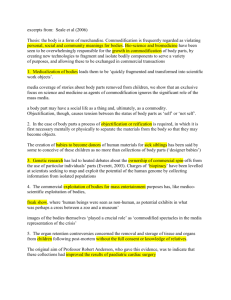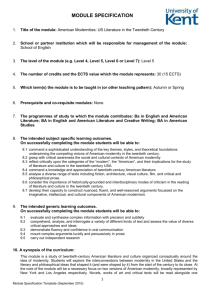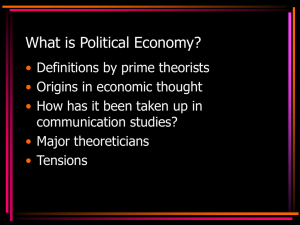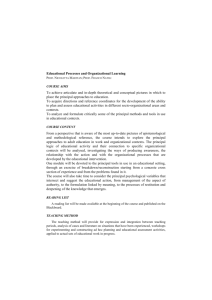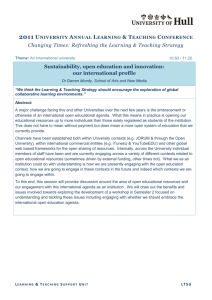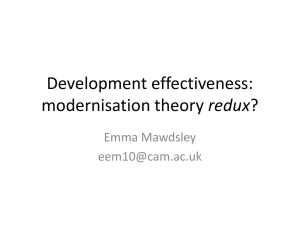From Anthony Giddens, Modernity and Self
advertisement
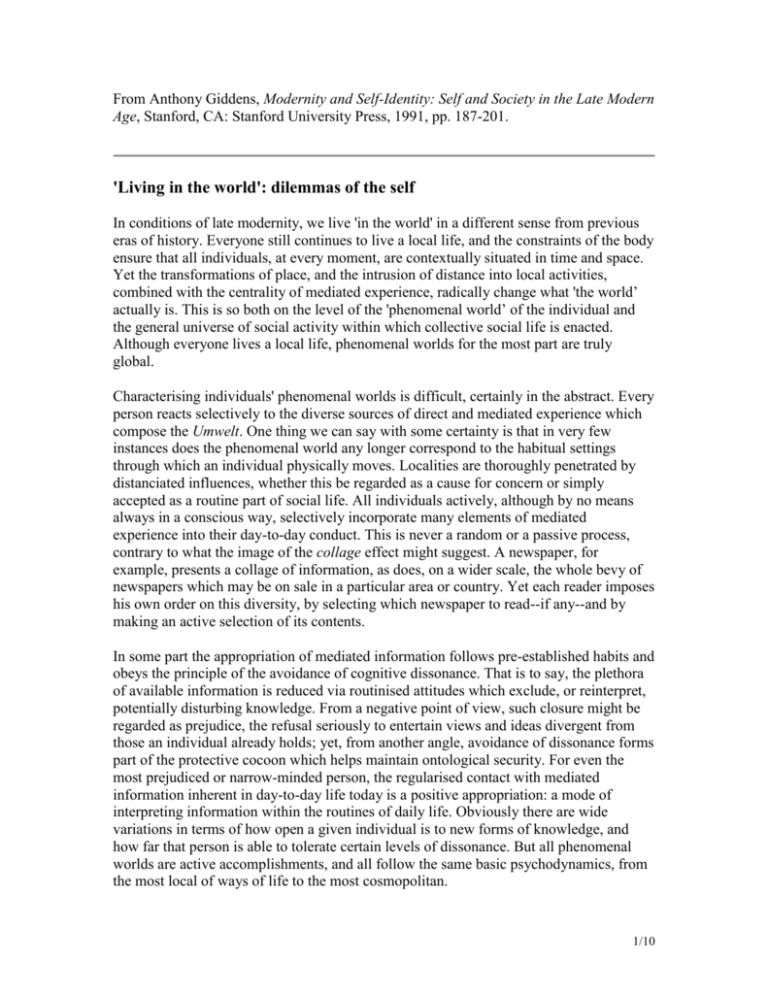
From Anthony Giddens, Modernity and Self-Identity: Self and Society in the Late Modern Age, Stanford, CA: Stanford University Press, 1991, pp. 187-201. 'Living in the world': dilemmas of the self In conditions of late modernity, we live 'in the world' in a different sense from previous eras of history. Everyone still continues to live a local life, and the constraints of the body ensure that all individuals, at every moment, are contextually situated in time and space. Yet the transformations of place, and the intrusion of distance into local activities, combined with the centrality of mediated experience, radically change what 'the world’ actually is. This is so both on the level of the 'phenomenal world’ of the individual and the general universe of social activity within which collective social life is enacted. Although everyone lives a local life, phenomenal worlds for the most part are truly global. Characterising individuals' phenomenal worlds is difficult, certainly in the abstract. Every person reacts selectively to the diverse sources of direct and mediated experience which compose the Umwelt. One thing we can say with some certainty is that in very few instances does the phenomenal world any longer correspond to the habitual settings through which an individual physically moves. Localities are thoroughly penetrated by distanciated influences, whether this be regarded as a cause for concern or simply accepted as a routine part of social life. All individuals actively, although by no means always in a conscious way, selectively incorporate many elements of mediated experience into their day-to-day conduct. This is never a random or a passive process, contrary to what the image of the collage effect might suggest. A newspaper, for example, presents a collage of information, as does, on a wider scale, the whole bevy of newspapers which may be on sale in a particular area or country. Yet each reader imposes his own order on this diversity, by selecting which newspaper to read--if any--and by making an active selection of its contents. In some part the appropriation of mediated information follows pre-established habits and obeys the principle of the avoidance of cognitive dissonance. That is to say, the plethora of available information is reduced via routinised attitudes which exclude, or reinterpret, potentially disturbing knowledge. From a negative point of view, such closure might be regarded as prejudice, the refusal seriously to entertain views and ideas divergent from those an individual already holds; yet, from another angle, avoidance of dissonance forms part of the protective cocoon which helps maintain ontological security. For even the most prejudiced or narrow-minded person, the regularised contact with mediated information inherent in day-to-day life today is a positive appropriation: a mode of interpreting information within the routines of daily life. Obviously there are wide variations in terms of how open a given individual is to new forms of knowledge, and how far that person is able to tolerate certain levels of dissonance. But all phenomenal worlds are active accomplishments, and all follow the same basic psychodynamics, from the most local of ways of life to the most cosmopolitan. 1/10 'Living in the world', where the world is that of late modernity, involves various distinctive tensions and difficulties on the level of the self. We can analyse these most easily by understanding them as dilemmas which, on one level or another, have to be resolved in order to preserve a coherent narrative of self-identity. Unification versus fragmentation The first dilemma is that of unification versus fragmentation. Modernity fragments; it also unites. On the level of the individual right up to that of planetary systems as a whole, tendencies towards dispersal vie with those promoting integration. So far as the self is concerned, the problem of unification concerns protecting and reconstructing the narrative of self-identity in the face of the massive intensional and extensional changes which modernity sets into being. In most pre-modern contexts, the fragmentation of experience was not a prime source of anxiety. Trust relations were localised and focused through personal ties, even if intimacy in the modern sense was generally lacking. In a post-traditional order, however, an indefinite range of possibilities present themselves, not just in respect of options for behaviour, but in respect also of the 'openness of the world' to the individual. ‘The world’, as indicated above, is not a seamless order of time and space stretching away from the individual; it intrudes into presence via an array of varying channels and sources. Yet it is wrong to see the world 'out there' as intrinsically alienating and oppressive to the degree to which social systems are either large in scale or spatially distant from the individual. Such phenomena may often be drawn on to supply unifying influences; they are not just fragmenting in their impact on the self. Distant events may become as familiar, or more so, than proximate influences, and integrated into the frameworks of personal experience. Situations 'at hand' may in fact be more opaque than large-scale happenings affecting many millions of people. Consider some examples. A person may be on the telephone to someone twelve thousand miles away and for the duration of the conversation be more closely bound up with the responses of that distant individual than with others sitting in the same room. The appearance, personality and policies of a world political leader may be better known to a given individual than those of his next-door neighbour. A person may be more familiar with the debate over global warming than with why the tap in the kitchen leaks. Nor are remote or large-scale phenomena necessarily factors only vaguely 'in the background' of an individual's psychological make-up and identity. A concern with global warming, for example, might form part of a distinctive lifestyle adopted by a person, even if she is not an ecological activist. Thus she might keep in close contact with scientific debates and adjust various aspects of her lifestyle in relation to the practical measures they suggest. Fragmentation clearly tends to be promoted by the influences emphasised by Berger and others: the diversifying of contexts of interaction. In many modern settings, individuals are caught up in a variety of differing encounters and milieux, each of which may call for different forms of appropriate' behaviour. Goffman is normally taken to be the theorist 2/10 par excellence of this phenomenon. As the individual leaves one encounter and enters another, he sensitively adjusts the 'presentation of self' in relation to whatever is demanded of a particular situation. Such a view is often thought to imply that an individual has as many selves as there are divergent contexts of interaction, an idea which somewhat resembles poststructuralist interpretations of the self, albeit from a differing theoretical perspective. Yet again it would not be correct to see contextual diversity as simply and inevitably promoting the fragmentation of the self, let alone its disintegration into multiple 'selves'. It can just as well, at least in many circumstances, promote an integration of self. The situation is rather like the contrast between rural and urban life discussed previously. A person may make use of diversity in order to create a distinctive self-identity which positively incorporates elements from different settings into an integrated narrative. Thus a cosmopolitan person is one precisely who draws strength from being at home in a variety of contexts. [4] The dilemma of unification versus fragmentation, like the others to be mentioned below, has its pathologies. On the one hand we find the type of person who constructs his identity around a set of fixed commitments, which act as a filter through which numerous different social environments are reacted to or interpreted. Such a person is a rigid traditionalist, in a compulsive sense, and refuses any relativism of context. On the other hand, in the case of a self which evaporates into the variegated contexts of action, we find the adaptive response which Erich Fromm has characterised as 'authoritarian conformity'. Fromm expresses this in the following way: The individual ceases to be himself; he adopts entirely the kind of personality offered to him by cultural patterns; and he therefore becomes exactly as all others are and as they expect him to be . . . this mechanism can be compared with the protective colouring some animals assume. They look so similar to their surroundings that they are hardly distinguishable from them. [5] In such circumstances, we might argue, the false self overrides and blankets out the original acts of thinking, feeling and willing which represent the true motivations of the individual. What remains of the true self is experienced as empty and inauthentic; yet this vacuum cannot be filled by the 'pseudo-selves' brought into play by the individual in different contexts, because these are as much stimulated by the responses of others as drawn from the person's inner convictions. Ontological security in this situation is as weakly founded as in the case of the rigid traditionalist. The individual only feels psychologically secure in his self-identity insofar as others recognise his behaviour as appropriate or reasonable. Powerlessness versus appropriation A second dilemma is that of powerlessness versus appropriation. If there is one theme which unites nearly all authors who have written on the self in modern society, it is the assertion that the individual experiences feelings of powerlessness in relation to a diverse 3/10 and large-scale social universe. In contrast to the traditional world, it is supposed, where the individual was substantially in control of many of the influences shaping his life, in modern societies that control has passed to external agencies. As specified by Marx, the concept of alienation has served as the centre-point for analyses of this issue. As the forces of production develop, particularly under the aegis of capitalistic production, the individual cedes control of his life circumstances to the dominating influences of machines and markets. What is originally human becomes alien; human powers are experienced as forces emanating from an objectified social environment. Not only the followers of Marx have expressed such a view; it is also found, in somewhat different guise, in the works of the theorists of 'mass society'. The more extensive modern social systems become, according to this position, the more each particular individual feels shorn of all autonomy. Each, as it were, is merely an atom in a vast agglomeration of other individuals. The ideas I have sought to develop in this book are distinctively different from such a standpoint. In many pre-modern contexts, individuals (and humanity as a whole) were more powerless than they are in modern settings. People typically lived in smaller groups and communities; but smallness is not the same as power. In many small-group settings individuals were relatively powerless to alter or escape from their surrounding social circumstances. The hold of tradition, for example, was often more or less unchallengeable. There are many other illustrations. Pre-modern kinship systems, for example, were often quite rigid, and offered the individual little scope for independent action. We would be hard pressed to substantiate an overall generalisation that, with the coming of modern institutions, most individuals either are (or feel) more powerless than in preceding times. Modernity expropriates--that is undeniable. Time-space distanciation and the deskilling effects of abstract systems are the two most important influences. Even if distance and powerlessness do not inevitably go together, the emergence of globalised connections, together with high consequence risks, represent parameters of social life over which the situated individual has relatively little control. Similarly, expropriation processes are part and parcel of the maturation of modern institutions and reach not only spheres of day-today life but the heart of the self. If we understand such processes in dialectical fashion, however, and if we see that globalisation produces not just extensional but intensional change, a complex picture emerges. We cannot say that all forms of expropriation necessarily provide the possibility of reappropriation, certainly on the level of individual conduct. Many of the processes transformed by disembedding, or reorganised in the light of the intrusion of abstract systems, move beyond the purview of the situated actor. On the other hand, others make possible forms of mastery over life circumstances unavailable in pre-modern situations. Powerlessness and reappropriation intertwine variously in different contexts and at varying times: given the dynamism of modernity, there is little stability in the relations between them. An individual who vests trust in others, or in a given abstract system, normally thereby recognises that she lacks the power to influence them significantly. Yet 4/10 the vesting of trust can also generate new capacities. Consider the example of money. In order to utilise money, an individual must participate in systems of economic exchange, banking and investment and so forth, over which she has little direct control. On the other hand, this process allows the individual--given sufficient resources--a diversity of opportunities which would otherwise be absent. The experience of powerlessness, considered as a psychic phenomenon, naturally always relates to aims, projects or aspirations held by the individual, as well as to the composition of the phenomenal world. Powerlessness experienced in a personal relationship may be psychologically more damaging and consequential than powerlessness felt in relation to more encompassing social systems. Of course, these may feed into one another in various ways. Diffuse anxieties about high-consequence risks, for instance, might contribute in a general fashion to feelings of powerlessness experienced by an individual in more local contexts. Conversely, feelings of personal impotence may become diffused 'upwards' towards more global concerns. It seems reasonable to posit that connections of this kind are likely to underlie a 'survival' mentality. A 'survivor' is someone who feels deprived of adequate social mastery in a threatening series of personal and social environments. Yet a survivalist outlook carries connotations of appropriation as well as of powerlessness. Someone who concentrates on surviving in personal relations, as in other spheres of life, cannot be said to have abandoned all autonomy over his or her life's circumstances. Even if only in a somewhat negative sense, the individual clearly seeks active mastery: to survive is to be able in a determined way to ride out the trials life presents and overcome them. Once again, the dilemma of powerlessness versus appropriation has its pathologies. Where an individual feels overwhelmed by a sense of powerlessness in the major domains of his phenomenal world, we may speak of a process of engulfment. The individual feels dominated by encroaching forces from the outside, which he is unable to resist or transcend. He feels either haunted by implacable forces robbing him of all autonomy of action, or caught up in a maelstrom of events in which he swirls around in a helpless fashion. At the other pole of the powerlessness/ appropriation divide is omnipotence. Like all personality pathologies, it is a fantasy state. The individual's sense of ontological security is achieved through a fantasy of dominance: the phenomenal world feels as if it is orchestrated by that person as a puppeteer. Since omnipotence is a defence it is brittle, and often links psychologically to the other pole of the powerlessness/ appropriation composition: in other words, under pressure it can dissolve into its contrary, engulfment. Authority versus uncertainty A third dilemma is that of authority versus uncertainty. In conditions of high modernity, in many areas of social life--including the domain of the self--there are no determinant authorities. There exist plenty of claimants to authority--far more than was true of premodern cultures. Tradition was itself a prime source of authority, not located within any 5/10 particular institution, but pervading many aspects of social life. Diffuse though it may have been, tradition was in an important sense a single authority. Although in the larger pre-modern cultures there may quite often have been clashes between rival traditions, for the most part traditional outlooks and ways of doing things precluded other alternatives. Even where there were vying traditions, involvement in a traditional framework was normally quite exclusive: the others were thereby rejected. When we speak of specific institutions of authority, religion obviously has a leading place. In virtually all smaller pre-modern cultures there was only one main religious order--although such cultures have had their share of sceptics, and magicians and sorcerers were available to those diverging from religious orthodoxy. Yet these alternatives were scarcely substitutes for the overarching authoritative reach of the dominant religious system. In larger traditional societies, where religious orders sometimes were more diversified, there was little pluralism in the modern sense: orthodoxy confronted various heresies. The local community and the kinship system were two further sources of stabilising authority, directly relevant to the sustaining of trust relations in traditional contexts. Both were the source of 'binding doctrines' as well as of forms of behaviour endowed with strong normative compulsion. Submission to traditional authorities, no matter how deep, did not remove uncertainty from day-to-day life in traditional cultures. The strength of pre-modern forms of authority could almost be understood as a response to the very unpredictability of daily life and to the number of influences felt to be outside human control. Religious authorities in particular quite often cultivated the feeling that individuals were surrounded by threats and dangers--since only the religious official was in a position to be able either to understand or to seek successfully to control these. Religious authority created mysteries while simultaneously claiming to have privileged access to them. [6] In modern times some forms of traditional authority continue to exist, including, of course, religion. Indeed, for reasons that are to do precisely with the connections between modernity and doubt, religion not only refuses to disappear but undergoes a resurgence. Yet there is now a basic contrast with the past. Forms of traditional authority become only authorities' among others, part of an indefinite pluralism of expertise. The expert, or the specialist, is quite different from the authority', where this term is understood in the traditional sense. Except where authority is sanctioned by the use of force (the authorities' of the state and legal authority), it becomes essentially equivalent to specialist advice. There are no authorities which span the diverse fields within which expertise is claimed-another way of repeating the point that everyone in modern systems is a lay person in virtually all aspects of social activity. Authority in this situation is no longer an alternative to doubt. On the contrary, modes of expertise are fuelled by the very principle of doubt; in assessing the claims of rival authorities, the lay individual tends to utilise that principle in the sceptical outlook which pluralistic circumstances almost inevitably presuppose. Of course, day-to-day life is not ordinarily experienced as perennially 'in doubt'. The reorganisation of daily life through abstract systems creates many routine forms of 6/10 activity having a higher level of predictability than most contexts in pre-modern cultures. Through the protective cocoon, most people are buffered most of the time from the experience of radical doubt as a serious challenge either to the routines of daily activity or to more far-reaching ambitions. The dilemma of authority versus doubt is ordinarily resolved through a mixture of routine and commitment to a certain form of lifestyle, plus the vesting of trust in a given series of abstract systems. Yet this 'compromise package', under pressure, can begin to disintegrate. Some individuals find it psychologically difficult or impossible to accept the existence of diverse, mutually conflicting authorities. They find that the freedom to choose is a burden and they seek solace in more overarching systems of authority. A predilection for dogmatic authoritarianism is the pathological tendency at this pole. A person in this situation is not necessarily a traditionalist, but essentially gives up faculties of critical judgment in exchange for the convictions supplied by an authority whose rules and provisions cover most aspects of his life. We should distinguish this attitude from faith, even faith in fundamentalist religious codes. For faith almost by definition rests on trust. Taking refuge in a dominant authority, however, is essentially an act of submission. The individual, as it were, no longer needs to engage in the problematic gamble which all trust relations presume. Instead, he or she identifies with a dominant authority on the basis of projection. The psychology of leadership plays an important role here. Submission to authority normally takes the form of a slavish adherence to an authority figure, taken to be all-knowing. At the other pole, we find pathological states in which individuals are virtually immobilised through a tendency towards universal doubt. In its most marked versions, this outlook takes the form of paranoia or a paralysis of the will so complete that the individual effectively withdraws altogether from ordinary social intercourse . Personalised versus commodified experience A fourth dilemma is that between personalised versus commodified experience. Modernity opens up the project of the self, but under conditions strongly influenced by standardizing effects of commodity capitalism. In this book I have not sought to trace out in a detailed fashion the impact of capitalistic production on modern social life. Suffice to affirm that capitalism is one of the main institutional dimensions of modernity, and that the capitalist accumulation process represents one of the prime driving forces behind modern institutions as a whole. Capitalism commodifies in various senses. The creation of the abstract commodity, as Marx pointed out, is perhaps the most basic element in the expansion of capitalism as an overall production system. Exchange-value is only created when use-values become irrelevant to the mechanisms whereby the production, sale and distribution of goods and services are carried on. Exchange-value thus allows for the disembedding of economic relations across indeterminate spans of time-space. 7/10 Commodification further, crucially, affects labour power: in fact labour power as such only comes into existence when separated as a commodity from 'labour' as a whole. Finally, commodification directly affects consumption processes, particularly with the maturation of the capitalistic order. The establishing of standardised consumption patterns, promoted through advertising and other methods, becomes central to economic growth. In all of these senses, commodification influences the project of the self and the establishing of lifestyles. We can detail the impact of commodification in the following ways. The capitalistic market, with its 'imperatives' of continuous expansion, attacks tradition. The spread of capitalism places large sectors (although by no means all) of social reproduction in the hands of markets for products and labour. Markets operate without regard to preestablished forms of behaviour, which for the most part represent obstacles to the creation of unfettered exchange. In the period of high modernity, capitalistic enterprise increasingly seeks to shape consumption as well as monopolise the conditions of production. From the beginning, markets promote individualism in the sense that they stress individual rights and responsibilities, but at first this phenomenon mainly concerns the freedom of contract and mobility intrinsic to capitalistic employment. Later, however, individualism becomes extended to the sphere of consumption, the designation of individual wants becoming basic to the continuity of the system. Market-governed freedom of individual choice becomes an enveloping framework of individual selfexpression. The very corruption of the notion of lifestyle', reflexively drawn into the sphere of advertising, epitomises these processes. Advertisers orient themselves to sociological classifications of consumer categories and at the same time foster specific consumption 'packages'. To a greater or lesser degree, the project of the self becomes translated into one of the possession of desired goods and the pursuit of artificially framed styles of life. The consequences of this situation have often been noted. The consumption of ever-novel goods becomes in some part a substitute for the genuine development of self; appearance replaces essence as the visible signs of successful consumption come actually to outweigh the use-values of the goods and services in question themselves. Bauman expresses this well: Individual needs of personal autonomy, self-definition, authentic life or personal perfection are all translated into the need to possess, and consume, market-offered goods. This translation, however, pertains to the appearance of use value of such goods, rather than to the use value itself; as such, it is intrinsically inadequate and ultimately self-defeating, leading to momentary assuagement of desires and lasting frustration of needs. .. . The gap between human needs and individual desires is produced by market domination; this gap is, at the same time, a condition of its reproduction. The market feeds on the unhappiness it generates: the fears, anxieties and the sufferings of personal inadequacy it induces release the consumer behaviour indispensable to its continuation. [7] 8/10 Commodification is in some ways even more insidious than this characterisation suggests. For the project of the self as such may become heavily commodified. Not just lifestyles, but self-actualisation is packaged and distributed according to market criteria. Self-help books, like Self Therapy, stand in a precarious position with regard to the commodified production of self- actualisation. In some ways such works break away from standardised, packaged consumption. Yet in so far as they become marketed as prepackaged theorems about how to 'get on' in life, they become caught up in the very processes they nominally oppose. The commodifying of consumption, it should be made clear, like other phenomena discussed earlier, is not just a matter of the reordering of existing behaviour patterns or spheres of life. Rather, consumption under the domination of mass markets is essentially a novel phenomenon, which participates directly in processes of the continuous reshaping of the conditions of day-to- day life. Mediated experience is centrally involved here. The mass media routinely present modes of life to which, it is implied, everyone should aspire; the lifestyles of the affluent are, in one form or another, made open to view and portrayed as worthy of emulation. More important, however, and more subtle, is the impact of the narratives the media convey. Here there is not necessarily the suggestion of a lifestyle to be aspired to; instead, stories are developed in such away as to create narrative coherence with which the reader or viewer can identify. No doubt soap operas, and other forms of media entertainment too, are escapes-substitutes for real satisfactions unobtainable in normal social conditions. Yet perhaps more important is the very narrative form they offer, suggesting models for the construction of narratives of the self. Soap operas mix predictability and contingency by means of formulae which, because they are well known to the audience, are slightly disturbing but at the same time reassuring. They offer mixtures of contingency, reflexivity and fate. The form is what matters rather than the content; in these stories one gains a sense of reflexive control over life circumstances, a feeling of a coherent narrative which is a reassuring balance to difficulties in sustaining the narrative of the self in actual social situations. Yet commodification does not carry the day unopposed on either an individual or collective level. Even the most oppressed of individuals--perhaps in some ways particularly the most oppressed--react creatively and interpretatively to processes of commodification which impinge on their lives. This is true both within the realm of mediated experience and of direct consumption. Response to mediated experience cannot be assessed purely in terms of the content of what is disseminated: individuals actively discriminate among types of available information as well as interpreting it in their own terms. Even young children evaluate television programmes in terms of their degree of realism, recognising that some are wholly fictional, and treat programmes as objects of scepticism, derision or humour. [8] The fact that commodification is not all-triumphant at a collective level is also important for realms of individual experience. Space, for example, becomes commodified as a fundamental part of disembedding processes. However, space does not thereby become fully commercialised or subject to the standardising impact of commodity production. Many aspects of the built environment, 9/10 and other spatial forms too, reassert themselves (through the active engagements of agents) in decommodified modes. Commodification is a driving force towards the emergence of internally referential systems; but, as will be discussed in the following section, external anchorings in aesthetic and moral experience refuse to disappear completely. It is against this complicated backdrop that we should understand processes of individuation. The reflexive project of the self is in some part necessarily a struggle against commodified influences, although not all aspects of commodification are inimical to it. A market system, almost by definition, generates a variety of available choices in the consumption of goods and services. Plurality of choice is in some substantial part the very outcome of commodified processes. Nor is commodification merely the same as standardisation. Where mass markets are at issue, it is clearly in the interests of producers to ensure the large-scale consumption of relatively standardised products. Yet standardisation can often be turned into a mode of creating individual qualities--as in the previously quoted example of clothing. Mass produced clothing still allows individuals to decide selectively on styles of dress, however much the standardising influence of fashion and other forces affect those individual decisions. A prime type of behaviour pathology associated with commodifying influences is narcissism--in this respect Lasch's thesis is valid, if over-generalised. Of course, narcissism springs from other sources too, especially as a deep seated phenomenon of personality development. But in so far as commodification, in the context of consumerism, promotes appearance as the prime arbiter of value, and sees selfdevelopment above all in terms of display, narcissistic traits are likely to become prominent. Individuation, however, also has its pathological aspects. All selfdevelopment depends on the mastering of appropriate responses to others; an individual who has to be 'different' from all others has no chance of reflexively developing a coherent self-identity. Excessive individuation has connections to conceptions of grandiosity. The individual is unable to discover a self-identity 'sober' enough to conform to the expectations of others in his social milieux. Unification versus fragmentation: the reflexive project of the self incorporates numerous contextual happenings and forms of mediated experience, through which a course must be charted. Powerlessness versus appropriation: the lifestyle options made available by modernity offer many opportunities for appropriation, hut also generate feelings of powerlessness. Authority versus uncertainty: in circumstances in which there are no final authorities, the reflexive project of the self must steer a way between commitment and uncertainty. Personalised versus commodified experience: the narrative of the self must be constructed in circumstances in which personal appropriation is influenced by standardised influences on consumption . 10/10

